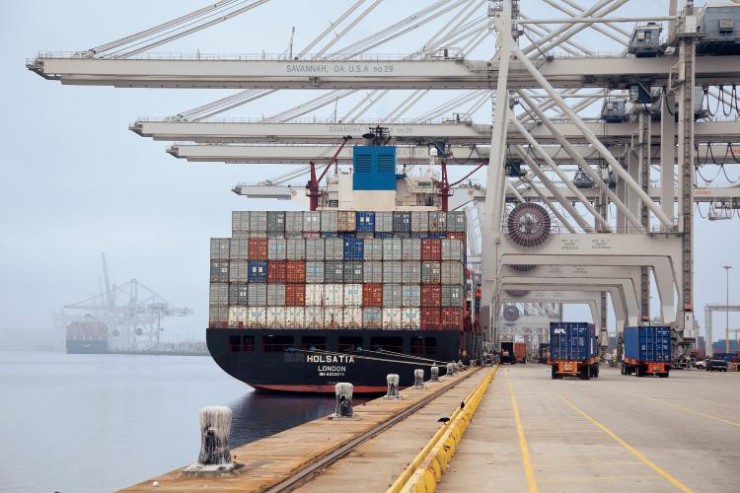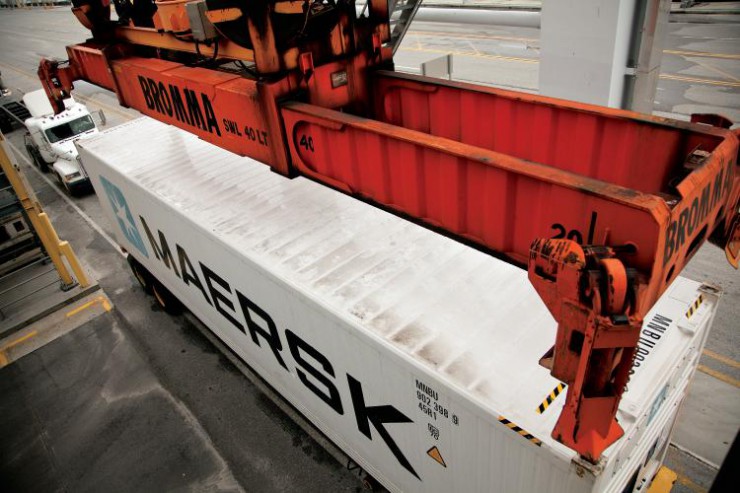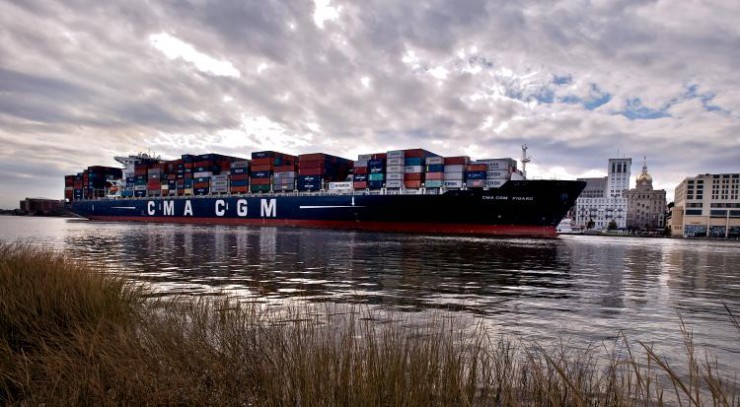Home > Georgia > Georgia Crops & Livestock > Georgia’s Port of Savannah is a Major Player in Global Agriculture
Georgia’s Port of Savannah is a Major Player in Global Agriculture

From peanuts to peaches and cotton to cocoa, Georgians know their homegrown products are a treat. And thanks to the bustling Port of Savannah, so does the rest of the world.
International agricultural exports from this area are older than Georgia itself. Enterprising traders have been taking products from the farm to foreign markets for nearly three centuries, since English nobleman James Edward Oglethorpe began settling the colony of Georgia in the 1730s.
By 1855, exports through Savannah’s port had grown to $20 million with cotton representing nearly 90 percent of those exports. More than 150 years later, in 2008, cotton remained Georgia’s leading agricultural export, valued at $584 million.
The value of today’s agricultural exports eclipses anything those early entrepreneurs might have imagined. In 2011, Georgia moved some 6.5 million tons of agricultural cargo through the nation’s deepwater ports, with a collective value of $4.93 billion.
As the nation’s fastest-growing port, the Port of Savannah has become a major player in the global agricultural market.
“It’s no coincidence that Savannah is America’s single largest gateway for poultry exports and that Georgia is the nation’s leading producer of chicken,” says James H. Sumner, President of the USA Poultry & Egg Export Council. “The strategic location of the Georgia Ports has helped to empower Georgia to be one of the largest exporters of poultry, benefiting the entire U.S. industry.”
Along with poultry, Georgia exports include other refrigerated cargoes such as onions and pecans, as well as forest products like paper and lumber. The Port of Brunswick handles agri-bulk cargo like grain and wood pellets; while containerized goods move through the Port of Savannah. Containers range from 20-foot to 40-foot long, and the largest containers can hold upwards of 60,000 pounds of cargo.

The process of getting the state’s diverse products from the farm to the port begins when growers throughout the state harvest poultry and farm produce. These products are then processed and prepared for shipment at regional facilities. The goods ultimately arrive at Georgia’s deepwater ports by truck and rail.
Over the years, Georgia has grown a thriving transportation industry to support its oldest and largest industry: agriculture.
“The state’s exporting success is possible because of its strong transportation infrastructure,” says Robert S. Jepson Jr., chair of the Georgia Ports Authority. “With two Class I rail lines, the world’s busiest airport, and the fastest growing ports in the nation, Georgia stands out for its ability to move people and goods efficiently.”
Home-grown exports play a key role in supporting the state’s agriculture industry, a major source of jobs. In fact, according to the Georgia Farm Bureau, one in seven Georgians work in agriculture, forestry or related fields; and agriculture contributes more than $68.9 billion annually to Georgia’s $719.8 billion economy.
But agricultural exports mean more than a boon to Georgia’s farmers. The ability to share the state’s bounty on a global scale is vital to the industries that feed off of agriculture, including food processing, storage and transportation.
“Expediting the flow of cargo cultivates opportunities in many sectors, from farming and manufacturing to transportation and logistics. This, in turn, creates a thriving business climate for Georgia and the entire Southeast,” Jepson says.
In fact, a study released by the University of Georgia in April 2012 shows that the state’s deepwater ports support more than 350,000 full- and part-time jobs across the state including more than 25,000 agriculture-related jobs. That’s 8.3 percent of Georgia’s total employment, and more than 56,000 new jobs since the last study was completed in 2009.

As Jepson says, “The deepwater ports at Savannah and Brunswick are important components of the state’s economic picture, tying Georgia’s economy to markets beyond our regional and national borders, and providing opportunities for retailers, manufacturers and agribusinesses alike.”
And those ports are thriving. The Port of Savannah has become the second busiest U.S. port for containerized export tonnage – second only to the Port of Los Angeles.
Savannah’s port is in the national spotlight these days as the focus of a channel deepening project that will ready it for the super-sized ships arriving after the Panama Canal expansion ends in 2014.
The pivotal project, which has been under review for some 15 years, will help the Port of Savannah continue as a vital link between Georgia farms and the world.
“Including farm products used for domestic consumption, Georgia growers contribute more than $70 billion to our annual economy,” Jepson says. “Peach State and U.S. farmers continue to provide not only food, fibers and forest products, but also economic stability for our state.”
And thanks to shipping portals like the one at Savannah, Georgia will continue to share its bounty with the world with benefits rippling throughout the Peach State and beyond.



